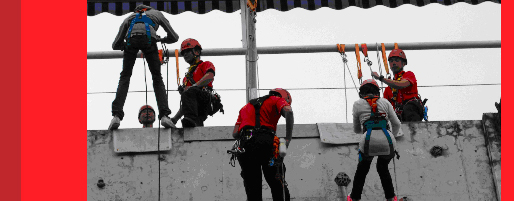
SUBVENTIONS
Lump Sum Grant Subventions
15.1
The Lump Sum Grant Subvention System (LSGSS), which aims to improve the delivery of welfare services through greater flexibility in resources deployment, has been implemented since 1 January 2001. As at 31 March 2013, 165 NGOs were funded under LSGSS, accounting for about 99% of the total subventions. SWD provides a one-stop service with advice, guidance and support to non-governmental organisations (NGOs) on issues relating to performance monitoring and subvention matters.
15.2
In early 2008, the Government appointed the Lump Sum Grant Independent Review Committee (IRC) to assess the overall effectiveness of the LSGSS. Having analysed the views collected, the IRC considered that the principles of the LSGSS are sound and the system is worth retaining. The Government accepted all the 36 recommendations made by the IRC for improving the LSGSS and had implemented or taken forward all the recommendations.
15.3
The Lump Sum Grant Independent Complaints Handling Committee handles Lump Sum Grant related complaints that cannot be dealt with satisfactorily by NGOs.
Service Performance Monitoring System
15.4
The Service Performance Monitoring System (SPMS) of SWD aims to ensure that:
- service operators are responsible and accountable to their service users, SWD and the community for the proper and prudent use of public funds to deliver welfare services;
- service operators are providing quality social welfare services to service users; and
- service operators are pursuing service quality improvement in response to changing community needs.
15.5
The SPMS includes:
- submission of self-assessment reports on Essential Service Requirements, Service Quality Standards, Output Standards and Outcome Standards by service operators on their service units’ performance with specific action plans on non-compliant areas;
- submission of variance reports on the performance of Output Standards and Outcome Standards by service operators; and
- conducting review/surprise visits and on-site assessments by SWD for selected service units to assess their implementation of the above performance standards.
Best Practice Manual
15.6
The IRC recommended in its Review Report in December 2008 that a Best Practice Manual (BPM) for NGOs on various management issues such as human resource policies, the level of reserves and their gainful deployment, corporate governance and accountability, etc., should be developed by the welfare sector, with professional input from management experts if necessary; and that the Lump Sum Grant Steering Committee (LSGSC) should work with the sector in drawing up this manual. In late 2010, SWD commissioned a consultancy study for the production of the BPM. The meeting of the Lump Sum Grant Steering Committee held in November 2012 noted the draft research report and agreed that SWD and the consultant should gauge the sector’s views on the preliminary framework of the BPM for the preparation of the draft BPM. Since December 2012, SWD and the consultant have conducted a number of consultation sessions for the sector, with the expectation that the consultations will be completed by April 2013.
Social Welfare Development Fund
15.7
The IRC also recommended in its Review Report to set up a $1 billion Social Welfare Development Fund (SWDF) to support 171 subvented NGOs in carrying out training and professional development programmes, business system upgrading projects and service delivery enhancement studies. With the funding support of the Lotteries Fund Advisory Committee, SWD launched the SWDF in January 2010 for implementation by three three-year phases for nine years in total from 2010-11 to 2018-19. As at 31 March 2013, about $262.9 million was approved for 150 NGOs to operate IT-related and non-IT-related projects. For SWDF phase 2 (2013-2016), invitation for applications was issued to all subvented NGOs in January 2013.
Charitable Fund-raising
15.8
Under Section 88 of the Inland Revenue Ordinance, Cap. 112, the Inland Revenue Department grants tax exemption to charitable institutions or trusts of a public character. The Director of Social Welfare (DSW) issues permits under Section 4(17)(i) of the Summary Offences Ordinance, Cap. 228, for any collection of money or sale or exchange for donation of badges, tokens or similar articles for charitable purposes in public places while the Secretary for Home Affairs issues Permits for fund-raising activities of other purposes under Section 4(17)(ii) of the same Ordinance, and the Secretary for Home Affairs issues licences under the Gambling Ordinance, Cap. 148, for the conduct and sale of lotteries. In 2011-12 and 2012-13, a total of 1 094 permits were issued by DSW, including permits for flag days.
15.9
To improve the transparency and accountability of charitable fund-raising activities, SWD has promulgated the “Reference Guide on Best Practices for Charitable Fund-raising Activities” (the Guide), which covers best practices in the areas on Donors' Right, Fund-raising Practices and Financial Accountability. Charities are encouraged to adopt these best practices voluntarily for their fund-raising activities. The public is also encouraged to use the Guide as a reference against which the performance of a charity in fund-raising can be measured.
INFORMATION TECHNOLOGY
15.10
The Information Systems and Technology Branch (ISTB) provides information technology (IT) support and advice to meet SWD's business needs and implements SWD's Information Systems Strategy (ISS). It also promotes the use of IT to bring about more effective organisation management and service delivery among NGOs in the social welfare sector.
Departmental Information Technology Plan
15.11
The Review of the Departmental Information Technology Plan (DITP) was completed in June 2012. Under the new DITP, IT projects and initiatives have been recommended to enhance the Department’s operational efficiency and service delivery as well as to accommodate new computerisation requirements arising from the changes of business needs in the coming five financial years.
Information Technology Strategy for the Social Welfare Sector
15.12
The Review of the Information Technology Strategy for the Social Welfare Sector was completed in March 2013. The consultant has recommended the strategic directions and measures to further foster the IT development in the sector for the next five years.
HUMAN RESOURCES MANAGEMENT
15.13
With a workforce of 5 326 staff as at 31 March 2013, of which 4 209 in 31 grades are departmental/common staff (including 2 090 in social work stream and 1 545 in social security stream), SWD is committed to adopting a proactive and integrated approach to manage human resources and building a professional, dedicated and satisfying workforce.
15.14
The mission of the Human Resources Management (HRM) Branch is to initiate and co-ordinate efforts in building a highly committed, competent, versatile and skilled workforce to meet the business objectives of SWD and the new challenges and demands in the coming years. Underpinned by the Grade Management Section and the Staff Development and Training Section, the HRM Branch is tasked to map out the overall strategy for HRM development in SWD and to oversee the formulation and implementation of HRM plans and initiatives. Management's efforts in HRM are complemented by activities run by the SWD Recreation Club and Staff Volunteer Team.
Grade Management Section
15.15
The Grade Management Section (GMS) aims to develop a more focused, systematic and integrated approach for the management of Departmental and Common Grades as well as Model Scale I staff in terms of manpower planning, career development and training, recruitment, posting, performance management and promotion. The departmental posting policy and mechanism has been in place since May 2002 and revisions are made after periodic reviews to better meet the operational needs of the Department. With a view to further enhancing its operation, three Working Groups were set up in 2011 to review the posting policy and mechanism for Social Work Assistant, Social Security Assistant and Welfare Worker Grades respectively. The Working Groups comprised representatives from the management, staff side, Departmental Consultative Committee and staff unions/associations. They concluded their recommendations and the results of the review will be announced to staff by mid 2013. To better understand the concerns of staff members in their work settings as well as to listen to their views and comments, the GMS conducted 37 and 28 goodwill visits to different units in districts/headquarters and arranged 439 and 430 career interviews in 2011-12 and 2012-13 respectively.
Staff Development and Training Section
15.16
The Staff Development and Training Section (SDTS), comprising the HRM Development Unit, the Training Unit and the Training Administration Unit, is responsible for the formulation and implementation of the annual training and development plan and other HRM initiatives to enhance business efficiency and career development of staff members. A total of 612 programmes were organised and co-ordinated for about 14 925 participants from SWD, other government departments and NGOs in 2011-12 and 716 programmes for about
16 825 participants in 2012-13. The details are shown in Charts 20 to 23 below.
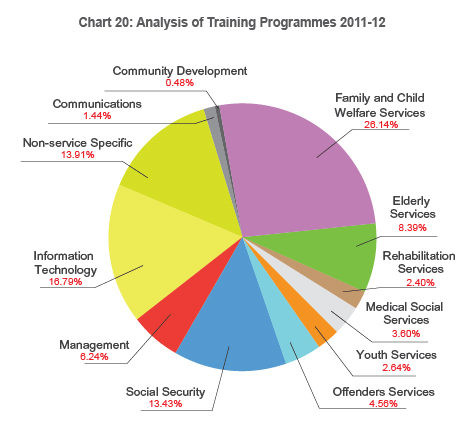
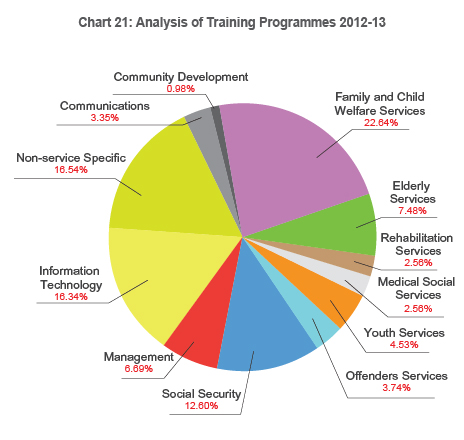
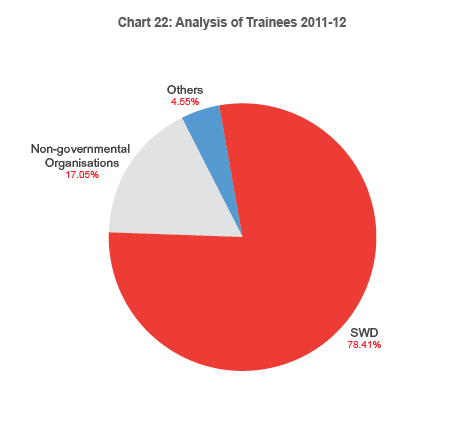
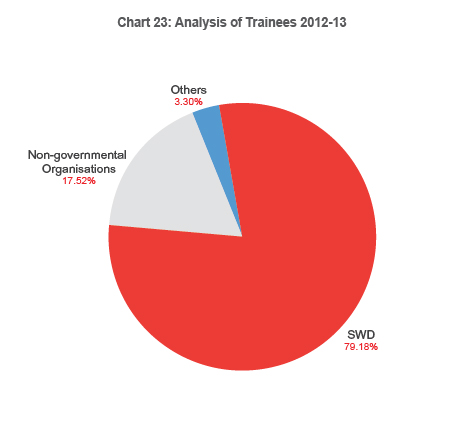
Note: Owing to rounding, percentages may not add up to 100.
15.17
Training on handling family violence and crises for SWD staff and related disciplines in the Government and NGOs was still a priority in 2011-12 and 2012-13. A total of 67 training programmes on handling of child abuse, intimate partner violence, elder abuse, suicide and family crises were organised in 2011-12 for 2 400 SWD staff and 900 participants from NGOs, Hospital Authority and other government departments and 69 training programmes on these topics were conducted in 2012-13 for 2 600 SWD staff and 1 200 participants from NGOs and other sectors. On top of basic training, advanced programmes with focus on risk assessment, crisis intervention, treatment and clinical skills, and post-trauma care for victims were conducted specifically for building up expertise of frontline practitioners in face of the growing complexity of cases.
15.18
To enhance closer links with the Mainland, apart from receiving visiting tours from the Mainland, SDTS organised two study tours to Beijing and Shenzhen for 70 social work and social security staff in 2011-12. In 2012-13, another two study tours were organised for 70 social work and social security staff to Beijing and Guangzhou. SDTS also arranged attachment programmes in the Department for Mainland officials.
15.19
To facilitate our new recruits in understanding the Department's core values and integrating into respective service units, specific orientation programmes for different grades were developed with topics ranging from professional knowledge to staff conduct. In 2011-12 and 2012-13, eight and 14 such enhanced programmes were conducted respectively for 177 and 319 new appointees from different grades.
15.20
Aiming at strengthening the managerial competency of officers at different levels, a series of multi-pronged management development training programmes have been developed/arranged. A tailor-made management development programme was conducted for Social Work Officers and Senior Social Security Officers in 2011-12 and 2012-13. A new management essentials training programme for Social Security Officers I has been developed and will be implemented in 2013-14. Advanced management and leadership training both conducted locally and overseas were also arranged for senior staff members to enhance their contemporary management skills and exchange their experience with senior executives in other sectors.
15.21
SDTS also delivered a series of training programmes covering areas in relation to professional, management and legal knowledge as well as customer services and communication skills for staff working in social security work settings in 2011-12 and 2012-13 with a view to enhancing their job competency in meeting work challenges. A total of 58 and 70 training programmes were organised for over 2 000 and
1 800 social security staff in 2011-12 and 2012-13 respectively. Among them, 26 training programmes were arranged each year to equip and enhance staff's knowledge and skills on social investigation and verification for proper management of social security applications.
SWD RECREATION CLUB AND STAFF VOLUNTEER SERVICE
15.22
In 2011-12 and 2012-13, the SWD Recreation Club organised a variety of recreational activities, staff volunteer service and major staff activity for SWD staff and their families, with a view to enabling them to relax in leisure time and to relieve their work pressure.
Recreational Activities
15.23
Recreational activities were arranged as follows:
- Sponsorship was provided in supporting district’s sport/recreational activities, including trips to Kut O, Ap Chau, Tung Ping Chau, Tap Mun, Sha Tau Kok restricted area, Marine Park and Lau Fau Shan.
- Sponsorship was provided in supporting staff to join competition events, such as Dragon Boat Racing Competition, Long Running Race, Social Work Cup 7-a-side Football Competition, Social Work Cup Basketball Competition and Corporate Games Basketball Competition.
- 29 interest classes, such as Pipa class, Chinese Calligraphy class, Line Dance class and six interest groups, namely the SWD Choir, the Chinese Orchestra, the Running Team, the Dragon Boat Team, the Basketball Team and the Football Team, were organised. The SWD Choir also performed in the annual National Day reception held by the Hong Kong Social Welfare Service Organisations in celebration of the anniversary of the establishment of the People's Republic of China. They also joined the Christmas Carols Fund Raising Event of “Child Development Matching Fund” in December 2012 together with DSW and the staff volunteers with children from “Angels' Act”.
Staff Volunteer Service
15.24
The Staff Volunteer Team participated in the Project “Angels' Act” by paying regular concern visits and arranging outdoor activities for DSW wards under out-of-home care, with a view to enabling the DSW wards to enjoy the sweetness and pleasure of family life during holidays. As at end of March 2013, there were 131 volunteers including staff and family members in the Project, forming 41 teams to serve 46 DSW wards.
Activities for DSW Wards
15.25
To commend the DSW wards for their improvement and outstanding achievement in their conduct, study and other areas showing their potentials, the Award Presentation Ceremony for the DSW wards with Best Achievement/Improvement sponsored by Tung Wah Group of Hospitals was organised for the years of 2012 and 2013.
Major Staff Activities
15.26
Two major staff activities, namely the “SWD Staff Games Day 2012” and the “SWD Staff Games Day 2013”, aimed at fostering a sense of belonging, improving internal communications and promoting team building among service branches and districts were organised by the SWD Recreation Club on 7 January 2012 and 12 January 2013 respectively. Over 200 SWD staff members participated in each of the Games Day. They all shared the joy and team spirit in the events.























